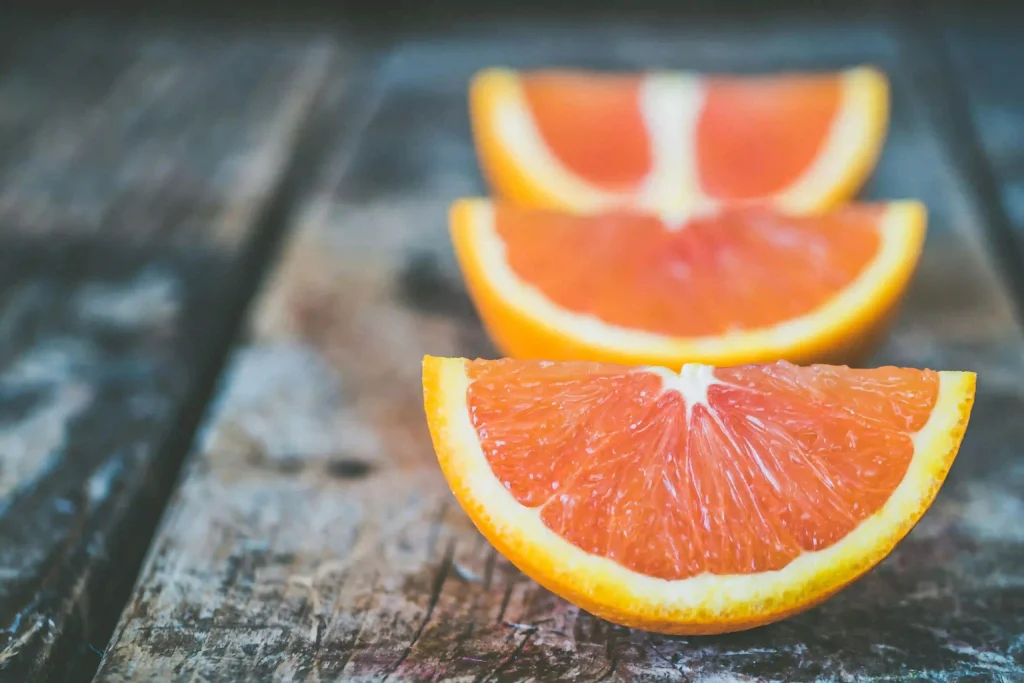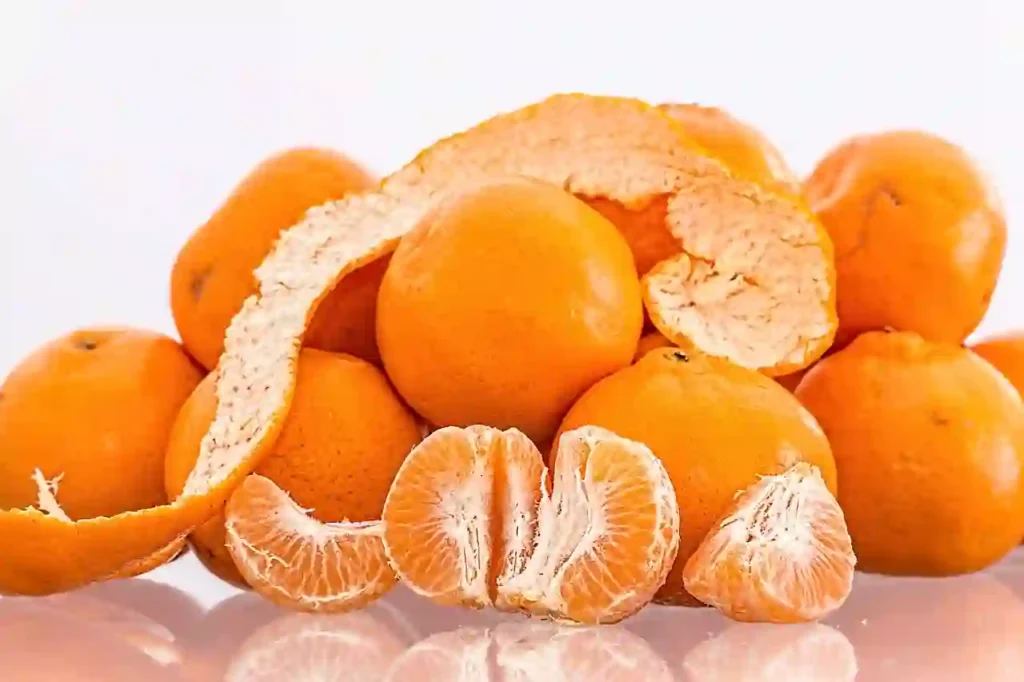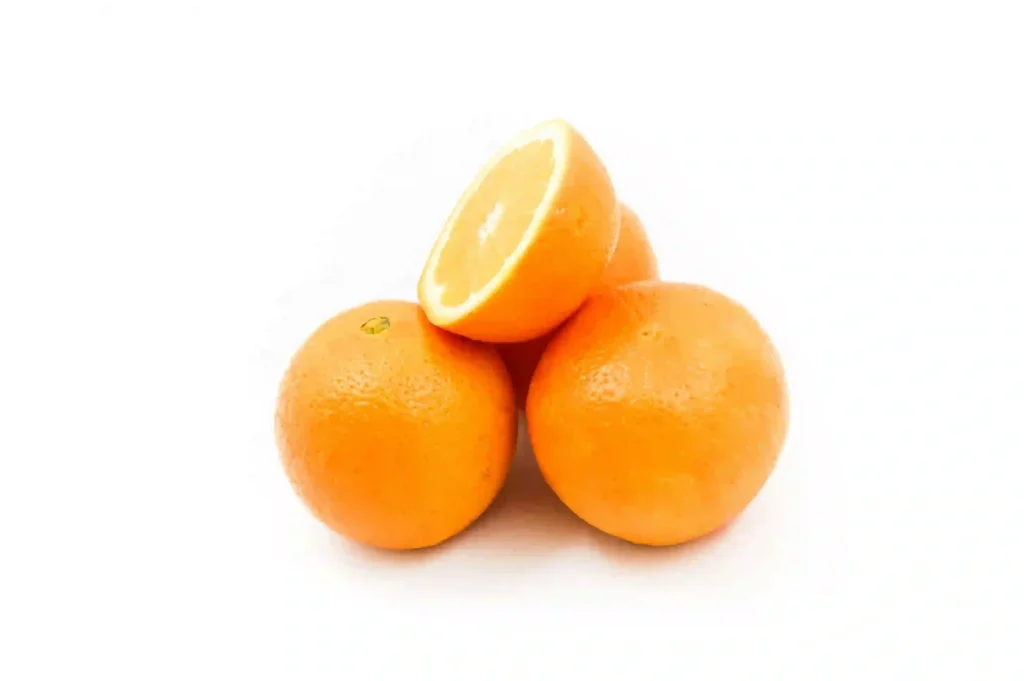Introduction

The solid accumulations found within the gallbladder known as gallstones create discomfort along with pain in affected individuals. The question of whether oranges remain safe when one has gallstones often challenges those affected by this condition. People with gallstones might experience negative effects on their gallbladder due to the acidic and fibrous components present in oranges. People with gallstones need to know if oranges will benefit or harm their health condition.
Table of Contents
1. Can I Eat Oranges with Gallstones?
The consumption of oranges remains possible for people with gallstones but it is important to practice moderation. The fiber content and acidity of oranges may cause minor discomfort to individuals.
The reddish fruit contains antioxidants and vitamin C which promote immune health while aiding digestion. eating oranges might cause pain for individuals with gallstones because the fruits produce acid which stimulates bile production. Monitor discomfort when eating oranges. Each person should add oranges into their meal plan in small amounts to track how their body reacts.
2. Are Oranges Safe for People with Gallstones?
The consumption of oranges remains harmless for the majority of individuals who suffer from gallstones. People who get gallbladder attacks should restrain their orange consumption.
The digestive benefits from oranges come from citric acid yet this substance could potentially activate gallbladder contractions which results in unpleasant discomfort. People who feel uncomfortable after orange consumption should limit their portion sizes until their body adjusts to them. Obtaining medical advice from a healthcare expert will establish the appropriate intake for your situation.
3. Do Oranges Affect Gallbladder Health?
The impact of oranges on the health of your gallbladder consists of beneficial aspects as well as unfavorable results. These fruits deliver necessary nutrients although they might provoke uneasiness in certain users.
Oranges contain substantial fiber levels that promote digestion together with their ability to reduce potential stone formation in gallbladders. Acidic orange liquids may cause discomfort to an inflamed gallbladder. People with active gallstones need to watch their orange intake or closely monitor any associated bodily reactions. Low-acid foods should accompany oranges to lessen any possible irritation.
4. Can Citrus Fruits Trigger Gallbladder Pain?

The acidic nature of oranges along with bile-stimulating properties causes pain in the gallbladder for certain individuals.
The production of bile which serves digestive functions becomes possible with citrus fruits unless your gallstones stop bile from flowing properly and causing pain. Consumers who encounter discomfort from eating oranges should combine fruits with other foods as a way to decrease irritation levels. Drinking water at the same time as citrus fruit consumptions has the benefit of reducing their acidic effects on the stomach.
5. How Does Orange Juice Impact Gallstones?
Some people might gain positive effects from drinking fresh orange juice yet high amounts of consumption may intensify gallstone symptoms because of its acidic nature.
Orange juice does not contain fiber yet it has high citric acid content that can activate bile production. There are benefits for digestion that come from orange juice consumption yet gallstones might cause discomfort when bile flow becomes obstructed. The healthiest way to consume fresh orange juice with its whole pulp content is in small amounts. The better decision regarding your health is to choose juice made from fresh fruits rather than processed drinks containing excess sugar.
6. Should You Avoid Oranges If You Have Gallbladder Issues?
Not necessarily. However if oranges do not stimulate unpleasant symptoms they can serve as effective nutrients in your meals. Consuming oranges should be limited when they lead to symptoms but they remain an option if they do not produce any adverse effects.
Oranges contain beneficial vitamins together with antioxidants to promote good health. Despite their acidic nature along with dietary fiber content these food items do not work well for every person who suffers from gallbladder problems. You must pay attention to your body signals before deciding to consume oranges. People should get medical advice from doctors or nutritionists when their gallbladder symptoms remain persistent.
7. What Are the Best Fruits for Gallbladder Health?
Natural fruits which benefit the gallbladder the most comprise apples together with pears and berries as well as melon. The fruits contain both low acidity and high fiber content that improves digestion while lowering gallstone formation risks.
Fruits containing plenty of fiber support bile production and reduce the risk of developing gallstones because they enhance digestive processes. The pectin compound present in apples and pears works to maintain proper bile function. Eating berries delivers anti-inflammatory antioxidants to the body while melons create a gentle stomach environment. The incorporation of these fruits offers protection for maintaining a wholesome gallbladder condition. An assortment of these specific fruits provides complete nutritional support together with digestive wellness.
8. Do Oranges Help in Preventing Gallstones?
The gallbladder benefit from orange consumption because vitamin C acts to produce bile and prevent cholesterol accumulation. Excessive consumption of these foods might introduce negative effects.
The process of cholesterol breakdown receives support from vitamin C intake according to research findings which results in a reduction in the likelihood of developing gallstones. The presence of fiber in oranges helps improve digestion while stopping bile from remaining stationary. The acid in oranges might cause discomfort to people with sensitive stomachs. The health benefits of moderate orange consumption alongside dietary fiber will protect the gallbladder without provoking discomfort. Other safe gallbladder supporting foods should be combined when eating oranges to enhance their health outcomes.
9. Can Oranges Worsen Gallstone Symptoms?

The acidic content in oranges might increase the symptoms of gallstones since it could lead to gallbladder muscle contractions that cause discomfort primarily for sensitive individuals.
Oral consumption of oranges will help bile flow through bile ducts thanks to citric acid but the effect may induce pain when gallstones interfere with the bile path. People who are vulnerable to gallbladder attacks need to observe their orange consumption and determine their appropriate portions based on their responses. A person with gallstones should eat oranges in smaller portions or combine them with neutral foods if these fruits trigger any adverse digestive symptoms. A natural approach to find out their tolerance involves slow introduction.
10. How Much Orange Can You Eat with Gallstones?
Those with gallstones must watch their orange consumption to a maximum of one small orange daily while observing their body functions to prevent discomfort.
The nutritious content of oranges serves the body well but its acidic nature influences digestion for people who have gallstones. Consuming an excess number of oranges will often result in digestive distress that leads to bloating and pain. A person can avoid digestive complications by starting with small portions while spreading their consumption throughout the day. People who experience negative effects from oranges should consider cutting down their consumption or replace acidic fruit choices with alternative options. People should always seek medical guidance to get tailored recommendations regarding their health.
11. Are There Any Alternatives to Oranges for Vitamin C?
Other foods such as bell peppers and strawberries, kiwi fruit and guava as well as broccoli offer vitamin C benefits without causing excessive acidity in the body.
Other fruits and vegetables provide high amounts of vitamin C to the body yet they lack the acidity that potentially triggers discomfort in the gallbladder. Both bell peppers and kiwi provide high vitamin C levels which surpass the content in oranges due to guava having even higher amounts. Switching between the recommended vitamin C foods helps one receive enough vitamin C naturally without encountering negative side effects from gallstones. Different sources of vitamin C create a balanced and nutritionally sufficient diet.
12. When Should You Avoid Eating Oranges with Gallstones?
Eating oranges should be avoided when they lead to pain alongside bloating or any discomfort specifically during gallbladder attacks or after eating large meals.
The consumption of oranges typically leads to gallbladder contractions that produce painful symptoms when gallstones limit bile from flowing properly. You need to stop consuming oranges from your diet when they cause any negative physical effects after eating them. The risk of irritation increases when you eat orange fruits either fasting or with fatty dining because this combination increases the chance of irritation. Monitoring what you eat through a food diary enables you to discover particular food triggers that enable better dietary planning.
Conclusion
The consumption of oranges as a nutritious food is suitable for people with gallstones yet you should maintain controlled portions. Oranges deliver vitamin C and fiber benefits to digestion though their acidity level could cause issues for specific people. The intake of oranges should be decreased or you can try other low-acidity options such as berries or bell peppers if you develop bloating or pain after consuming them. People should monitor their bodily signals while seeking expert medical advice regarding their diet needs. Taking control of your diet choices will support a healthy gallbladder function as you keep a nutritious diet.